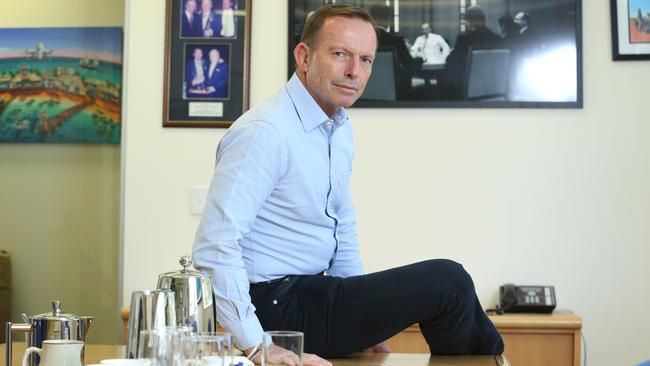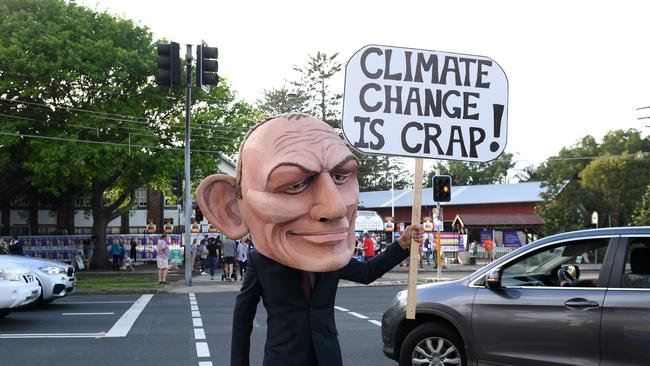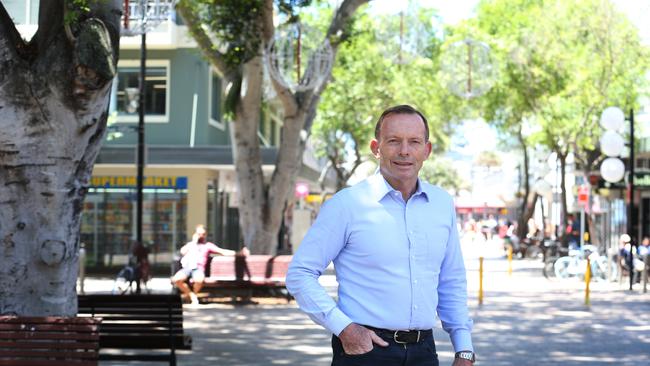Anti-Abbott forces coalesce to put the war in Warringah
He’s fended off challengers in Warringah over the years, but Tony Abbott’s local foes are massing in numbers he’s never seen before.

Tony Abbott realised he had the fight of his political life on his hands in Warringah when his local foes recently multiplied to numbers never encountered before.
Through the years, he has fended off a few independent challengers in his ultra-safe Liberal seat on Sydney’s northern beaches.
Several hundred GetUp volunteers urged voters at polling booths in 2016 to “put Abbott last” when the former prime minister faced an independent, former Australian Idol host James Mathison.
Abbott suffered a 9.2 per cent swing against him but still scored 51.6 per cent of the primary vote.
Next year’s election could be different, and the normally confident local member looks worried for the first time since 2001 when Manly independent mayor Peter Macdonald ran as a formidable opponent.
“I’m certainly expecting a very strong campaign against me,” Abbott tells Inquirer. “A very, very fierce anti-Abbott campaign.”
As Abbott faces voters for the ninth time since entering parliament at a by-election in 1994, an extraordinary array of so-called grassroots groups have popped up to target him. They come with colourful names, some suggesting a local focus, such as Time’s Up Tony, Vote Tony Out, Voices of Warringah and People of Warringah.
Others, while directed at ousting Abbott, have broader themes such as Stop Adani Warringah and the North Shore Environmental Stewards. The largest, loudest and most organised is GetUp.

Most disturbing, Abbott says, is how most seem to be working together — and how some are close to his own party. How did it come to this?
Last month’s by-election to choose Malcolm Turnbull’s successor in Wentworth changed the game. As Liberal antagonists, Abbott and Turnbull appeared so very different as their heavily populated, affluent city-suburban electorates stared at each other, across the Sydney Harbour heads, as Liberal strongholds.
No more. If a strong independent such as Kerryn Phelps could win by exploiting disillusion among Wentworth’s voters from Vaucluse to Bronte, then Abbott knows his seat could be next.
GetUp commissioned a ReachTel poll of 854 Warringah electorate voters in September that indicated Abbott’s seat might already have turned from safe Liberal to marginal.
The poll found Abbott still ahead 54 to 46 per cent on a two-party-preferred vote but, critically, his primary vote had sunk to 39.3 per cent.
Abbott, rightly, says the circumstances of Wentworth are different. He is Warringah’s incumbent Liberal and is deeply involved in community life. Phelps surfed into office on a tide of disenchantment about how Turnbull, the departed local hero, was treated. But Abbott is concerned the Turnbull effect could hurt him too, even if he thinks it unfair. In a toxic political climate in which the government has lost its majority and Julia Banks’s defection this week has compounded Scott Morrison’s woes, finger-pointing has not abated. Abbott knows opponents within the Liberal Party, and outside it, blame him for what happened to Turnbull. He knows some also want to punish him as a protest against the Liberals’ perceived lack of action on climate change and offshore detention of asylum-seekers.
It was Dave Sharma’s low primary vote in the Wentworth by-election that put him in danger territory — scoring equivalent to ReachTel’s 39.3 per cent for Abbott. The Wentworth by-election ended up close, but Phelps won by coming second and then pulling ahead with preferences from Labor, Greens and most other independents.
This is the nightmare scenario for Abbott in Warringah. So far, one possible contender, writer and commentator Jane Caro, has signalled interest on Twitter about running as an independent, though she would need to renounce her British citizenship and seems equivocal.
Abbott, vigilant as ever, will fight hard. “There is little doubt that Turnbull’s departure and his subsequent attacks on the party have licensed an element inside the party, or who normally support the party, to be hypercritical of me,” he tells Inquirer.
“There’s no doubt people in the Turnbull camp have claimed that I was somehow responsible for his demise. Look, I was a backbencher. I was critical of some elements of the government’s policy under Turnbull.
“I certainly disagreed most strenuously with the national energy guarantee, and it’s interesting that Turnbull ultimately dumped it. But I really had no part in the events of the week where he lost his leadership. I was a Dutton supporter, as you’d expect, but I didn’t do numbers, I wasn’t part of his campaign, I wasn’t his intimate confidant.
“Unfortunately, Malcolm was the real author of his demise by, first of all, persisting for too long with the policy he should have known our partyroom was never going to be comfortable with. And second, bunging on a spill motion he didn’t have to, which exposed the fragility of his own support.”
Abbott says Morrison, meanwhile, has not made it “crystal clear” why there was a change of leadership. The fundamental reason, says Abbott, is Turnbull wanted to turn the Liberals, a party of the Centre-Right, into a party of the Centre-Left.
“He wanted to turn us into Labor without the unions, and I think that is unacceptable to the vast majority of Liberal Party members inside and outside the parliament.
“I also think it is a fundamental political mistake because there is already a party of the Centre-Left, or the Left in this country — the Labor Party — and our job is to be a party of the sensible Right, not a pale imitation of Labor.”
Abbott disputes Turnbull’s claim that his failed energy guarantee policy, which provided the trigger for Peter Dutton’s move against him, had overwhelming support in the Liberal partyroom. He says the group of a half-dozen dissenters willing to cross the floor was set to more than double if Turnbull persisted.
Harking back to 2009, Abbott says Turnbull, in his first incarnation as Liberal leader in opposition, falsely declared he had partyroom support to back Kevin Rudd’s emissions trading scheme. “So he has form when it comes to misreading, I would say misrepresenting, the position inside the partyroom. And on both occasions it was instrumental in his downfall.”
Asked if he thinks Liberal voters in Warringah could be swayed by an independent capitalising on perceptions of Coalition inaction on climate change, Abbott puts the case for his own credentials.
Denying he is a nay-sayer, he tells Inquirer that the government should act on climate change. He regards himself as a “very strong conservationist”, and credits the government he led with starting an emissions reduction fund, at a cost of $10 a tonne, or cheaper than renewable energy targets. “I’ve never been against action on emissions reduction. I’ve only been against expensive and futile action,” he says.

Citing Australia’s Chief Scientist as his authority, Abbott also says nothing Australia does will make any significant difference to global emissions while India, China and the US are not committing to major emissions cuts, and Europe is “promising but not delivering”.
Even without a carbon tax, Abbott says, Australia has significantly reduced its emissions. When he, as prime minister, signed up to a 26 per cent reduction for the Paris Agreement, Abbott says he did so on the advice of bureaucracy that “no new policy would be required to achieve it”.
Abbott acknowledges some voters in his electorate believe climate change is the biggest issue confronting the nation, though he is “plainly not one of them”. He says climate change, while significant, is not a “first rank” issue: “If you want someone who is a climate change crusader then I’m not your man.”
These words fuel the passions of anti-Abbott groups in Warringah. Richard Walker, GetUp’s local campaign convener, says Abbott’s electorate sees him as “very out of touch”.
“People are very unhappy with him,” he says. “I’ve spoken to people who’ve voted for the Liberal Party probably forever, and they’re certainly not going to vote for Tony Abbott this time.
“The reason they give is his position on climate change, comments he’s made about refugees on Manus Island and his attitude to women. So there’s a palpable feeling in the electorate that’s really very anti-Tony Abbott.”
GetUp attracted more than 600 to a community meeting on November 20 at Manly wharf to rouse support and organise volunteers for a big doorknocking event planned next Saturday. Walker says GetUp is targeting Abbott on social media, and has set up a local call centre. Anti-Abbott posters have started appearing in the streets of Warringah. World surfing champion Layne Beachley features on Instagram wearing a “Time’s Up Tony” T-shirt.
Walker says all local anti-Abbott groups met in Mosman recently and agreed on co-ordinated action. “There’s a feeling out of high-profile candidates that’s currently going on … we’re all connected, we’re all communicating with each other. It’s pretty clear that an independent candidate will emerge by the end of the year.”
Walker says one vocal anti-Abbott group, the North Shore Environmental Stewards, are “essentially micro-Liberals” although some members seem to belong to GetUp. Earlier this year, NSW Liberal moderates powerbroker Michael Photios was reported to have attended a group meeting at Seaforth with his wife, Kristina. Photios played down his own role, saying his wife was invited to speak as an environmentalist, and neither the Liberal Party nor his faction was involved in setting the group. Nevertheless, Photios, not his wife, addressed the gathering.
Abbott, for one, calls the group a “front” for some to infiltrate the Neutral Bay branch of his party. As for GetUp, Abbott brands it “Labor in disguise”. “This claim by GetUp that it is some kind of politics-free zone is bullshit,” he says. “They always support Labor or Greens candidates, or causes, and they campaign against conservative Liberals.”
Other Liberal links have surfaced in the push against Abbott. The head of People for Warringah, Nathan Thomas, is a former young Liberal. Turnbull’s son Alex, who advocated a Labor vote in Wentworth, sparking claims he was a proxy for his father, has offered funding for an independent in Warringah. Turnbull himself infuriated conservatives in his party by joining wife Lucy and Alex in following an Instagram account last month called “Vote Tony Out”. He later tweeted that following someone on social media did not “imply support, approval or endorsement”.
But Abbott supporters from his party’s Roseville branch, just outside Warringah, voted 16-2 to move a motion at the Liberals’ next federal conference to expel Turnbull. Abbott was re-endorsed unopposed as the Liberals’ Warringah candidate in September, scoring 68 votes. Despite no party challenger, 30 voted against him. He calls them “Turnbull types”.
Stretching from Neutral Bay, Mosman and Manly in the south to Allambie Heights and parts of Frenchs Forest in the north, Warringah is typically suburban and also covers Sydney’s northern beaches and large tracts of bush. At the 2016 election, Abbott suffered swings against him in booths at the southern end. ABC election analyst Antony Green says the demographics have not changed much but the average age has.
“It’s a younger, more ‘liberal’ electorate than it was 20 years ago, not as blue rinse,” Green says. “The same-sex marriage plebiscite tells you what the electorate is like.” Warringah voted 75 per cent in favour — the fourth highest Yes vote in NSW — while Abbott advocated a No vote.
Abbott says at least as many Warringah voters would be concerned about the impact of Labor’s climate policy on power prices, as those Liberals alleging insufficient action on climate change. He is also betting on locals disliking Labor’s “retiree tax” — its proposed abolition of franking credit dividends. He calls it a “huge practical hit” for 12,000 self-funded Warringah retirees.
“For the majority of Warringah voters, I think what matters most — other than national concerns such as economic management, securing our prosperity and keeping our country safe — are local issues like building the northern beaches tunnel. Without it, our part of Sydney is going to be in a state of traffic gridlock for most of the day.”
Abbott asks: “Who do voters want as their MP? Someone who reflects 100 per cent of concerns or an effective fighter for the area? No one could do a better local job than me.”
Would he consider a return to the Coalition frontbench, or leading his party and become prime minister again? “I don’t rule any of those things out,” he says. “I’m 61, which is not old … I’m Australia’s best-known backbencher.”





To join the conversation, please log in. Don't have an account? Register
Join the conversation, you are commenting as Logout